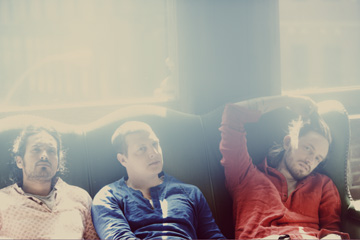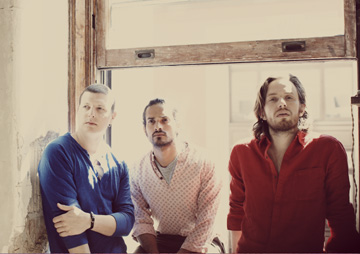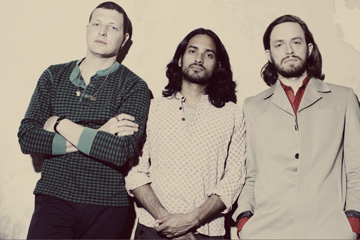Yeasayer: Apocalyptic Happiness

Photo by Anna Palma
Let’s get it straight: Yeasayer are not a bunch of trippy, drug-addled free-loving dudes making music perfect for an acid trip.
“People got this impression that we were like Laurel Canyon jamband prog-rock hippies or something,” snickers frontman Chris Keating as he sits next to me on the squeaky black leather couch in the band’s cluttered Brooklyn, N.Y. rehearsal space in the Greenpoint neighborhood. He’s outfitted in a decidedly non-bohemian ensemble of conductor-striped slim pants and a neon-hued leopard print tank with his dirty blond hair tucked away in a thuggish leather baseball cap.
Well, OK, maybe the music does inspire some recreational mind-altering, but there’s far more complexity to Yeasayer than an affirmative-centric moniker and swirling synth-laden tunes that are lazily lumped into the seemingly all-inclusive modern psychedelic genre. And after spending an afternoon with frontman Chris Keating and bassist Ira Wolf Tuton, it became instantly apparent that there’s far more substance – and not the illegal kind – when it comes to Yeasayer’s hard to classify yet strangely infectious sound.
*
Founded in 2005 by Keating and co-vocalist/guitarist Anand Wilder, who met as teens and attended the same high school as quirky sonic savants Animal Collective, the duo quickly enlisted Wilder’s cousin Tuton to join creative forces. “We just wanted to make a cool record – or what we thought was cool – and play some shows,” Keating says of the band’s humble aspirations. “We thought maybe we’d end up getting to go to Europe or something.”
Did they have any idea how well-received their sound would be?
“We thought we’d be further along,” Tuton says with a sinister chuckle. “That sarcasm won’t print very well, will it?” he asks tentatively.
It’s this type of dark sarcasm that also informs the story behind the eager-sounding band name that, instead of coming from a place of yes, is inspired by the evil that lurks behind the pristine exterior of motivational speakers, religious figures and cult leaders with a mindless following.
“I think we have a name of a band that’s super positive, and originally, it was meant in a way that’s like sickeningly and disgustingly positive that it becomes almost negative,” Keating says of the name. “Look at it like [televangelist] Joel Osteen – shiny teeth and weird nauseating positivity that if you look at [what he’s saying] with any cynicism or inquisitive nature, you know there’s something fucked up there.”
“It’s also coming from this place of interest with the cult mentality,” he continues as Tuton makes jokes about polygamists in the dark corner of the space. “A band is essentially an excuse to get together and have this communal revelry and weird cult worship for one hour. So the idea of the name plays into that too.”
While the breakout success of Yeasayer’s debut effort All Hour Cymbals created an immediate buzz, it wasn’t until the slightly esoteric and electronic-heavy, follow-up Odd Blood that the band forged ahead and away from the confines of easy genre classifications.
“[On Odd Blood ], we started experimenting with some of those ideas and had songs that we [had written] more up and in major keys to separate ourselves from what we were doing on the first record,” explains Keating in between giddy outbursts about Tuton’s meticulous organization of the snake-like wires on the carpeted floor. “I realized that some of those genre divisions and pigeonholing are not necessarily relevant to the way a millennial generation listens to music. Those feel very much like distinctions that were pre-Internet downloading mania. But, in general, the need to divide things into genres, I suppose, has some relationship to a human need to classify things.”

Fragrant World, Yeasayer’s flawless new beat-synth-and-sample-laden third album, has plenty of pop appeal, but doesn’t abandon the Brooklyn outfit’s signature multi-layered aesthetic. With traceable roots in the tribal-influenced dance elements and textural loops of Odd Blood, Yeasayer showed early indications of a more electronic-based musical trajectory. But on the critically acclaimed sophomore album, they were informed more by beats funneled through a global-minded sonic sensibility. Such is not the case on Fragrant World, where hip-shaking percussive stomps and R&B grooves dominate and the overtly romantic musings of previous efforts ( " Odd Blood was romantic – a little bit of sexy time," Keating confesses) are replaced by cinematic grandeur, undeniably danceable rhythms and dark lyrical commentary.
While they kept some of the same techniques practiced on past albums, with Fragrant World, they employed new technology, which Keating was more than happy to show off. “Yeah, see these things that he’s putting in this box right there,” he says as he excitedly points to the inconspicuous rectangular boxes housed at each band member’s station in the rehearsal space. “They are sampler controllers that do interesting manipulations of sound. Basically, they have sophisticated and new sampling technology and you can dump sounds into them and manipulate them and get some really cool results. You can take a drum beat and turn it through this filter in there and it will create tonal patterns. It’s like a weird chord structure that essentially comes out of nothing.”
Taking inspiration from Keating’s love of movies, they also borrowed sonic elements from the big screen. “There was this interesting sound design synthesizer we used – a soft synthesizer that’s used for doing movie scores called an Omnisphere,” says the film buff who finds creative stimulation from the minimal soundtracks of obscure auteur Werner Herzog. “It sounds great and weird and kind of has a mind of its own. I like those kinds of happy accidents.”
As surprising as it may seem, Keating wasn’t listening to obscure tunes or even of-the-moment blogger-approved artists – although he claims to stay current with his musical contemporaries – during the songwriting process of Fragrant World. Rather, he digested a lot of ‘90s hip-hop and R&B while writing the new record – think A Tribe Called Quest, Aaliyah and even some Toni Braxton thrown in for good measure.
While Keating didn’t have diva-ish ambitions, the innovative production techniques of the sometimes-frivolous genre inspired him.
“I definitely have always been inspired by legitimately soulful music,” he openly admits. “Trying to bridge that dichotomy between that kind of music and weirdly progressive electronic textural music is something that I don’t think has been done. We’re not rappers and R&B songstresses – not in the public sphere at least – but we’re interested in that style of production.”
*
Although there might be a perceptible soulful swagger on Fragrant World, don’t expect the lyrics to be all about love – on the contrary, current events, hyperbolized newspaper headlines and a disenchanted view of the political landscape inspired Keating and company.
“When we get around each other we get kind of dark in the way we see the world. So I think some of that was cathartically coming out through the music,” Keating explains. “I also feel like witnessing the rise of [President] Obama with a certain sense of positivity and then [having that] feeling unearthed [by] a really, really disgusting underbelly of deep-seated awful racism, hatred and a despicably backward sentiment [informed the album as well]. I have always written about apocalyptic shit.”
Adds Tuton as he emerges from a back room, cables in hand: “The indie rock world bothers me. I hate its permanent positivity and bubbliness. I think it’s disingenuous, and I don’t relate to it.”

Photo by Anna Palma
The lyrical sentiment of Fragrant World is far from being overtly preachy – unlike the cultish figures and cartoonish religious demagogues that helped inspire the band’s moniker. Instead, they subtly weave social commentary into visually evocative poetry that is oblique enough to conjure multiple personal meanings but direct enough for the listener to catch a scathingly critical line in the midst of a synth squeal or thumping bassline. Thanks to hypnotic rhythms, kaleidoscopic sound textures and intoxicating layered soundscapes, the inherent darkness is buoyed artfully, making the cryptic message almost more powerful.
This dark-and-light dichotomy is best represented on “Henrietta,” the arresting first single off Fragrant World. Henrietta Lacks, an African American woman who passed away from cervical cancer in 1950, only to have her resilient tumors live on past her death, inspired the song. Because of her self-reproducing cells, Lacks became a guinea pig for scientists, which was helpful but created ripples of moral questionability.
“Apparently those cells from one woman could stretch around the world many, many times,” Keating explains about the story that spawned the song. “And there’s also a sinister side too, because she was basically turned into a commodity in a way for pharmaceutical companies and it became possible for a company to take over the rights to your own body.”
In true Yeasayer form, Keating twisted the macabre yet miraculous story into a swaying sci-fi love song, complete with allusions to immortality through lovemaking. Maybe he took more than just production inspiration from those ‘90s slow jams? “Mid-tempo come-on music is what I think we wanted it to be,” he says of the mantra of the album. “I think that’s what R. Kelly used to describe his music as.”
When I met with Chris and Tuton, the band was readying for a worldwide tour where they plan to unleash the new songs. This all comes months before the official album release, which means exposing fans to the material. “Yeah, I’m nervous – actually really nervous. I think they’ll like it once they’ve heard the record,” Keating says of bringing the new tunes on the road. “We’re going out on tour in three days and the record isn’t coming out until August, and they won’t know any of it. We’re going to play mostly new songs. But it’s good because then you really have to try to play them to make them stand out.”
To give the audience members an ultra-sensory experience – much like the hallucinatory drugs that pair perfectly with the band’s sonic point of view – Yeasayer will also be featuring elaborate visuals created to accompany the fresh music.
“All sets are inherently different because every night is a different crowd, different energy,” Tuton chimes in. “We’re trying to put on the best, most cohesive show possible. And it’s also tied into the visuals too. That’s an important aspect of the live experience.”
(Having not done so earlier, Tuton’s musical pedigree needs to be mentioned though he typically downplays it: He played bass in the Philadelphia-based jamtronica outfit The Ally with Eric Zeiler who now fronts Xylos, while also participating in a Disco Biscuits side projected called The Cookie Dusters, which featured that band’s guitarist Jon Gutwillig along with drummers Joe Russo (Furthur) and Mike Greenfield (Lotus).)
Fragrant World is, hands-down, the most sonically accessible Yeasayer album, thanks to the soul-infused danceabilty and undulating grooves that dominate the solid effort. Keating doesn’t have a problem with this pop appeal, especially if that means exposing younger fans and concertgoers to more obscure bands.
“If you can walk that line and not compromise and not try to sell out, then [pop music] is cool,” he says while checking his phone. “We just do what we like. We’re trying different avenues. I think it’s cool if you can turn some kids on to some cool music, like if we were able to act as the entry point into weirder stuff.”
According to Keating, Yeasayer might be the ultimate gateway drug for the music world, but that doesn’t mean that they don’t have greater ambitions. While they’re not looking for world domination – like Tuton’s previous sarcasm might lead you to believe – they do hope to leave a lasting aural impact, but on their terms.
“I think the best way to do that is to access as many people as possible without compromising your integrity,” Keating concludes. “It’s tough, but I think of certain bands who have a huge impact and still have integrity. There’s not many left, but I would like to be one of those types of bands.”



















